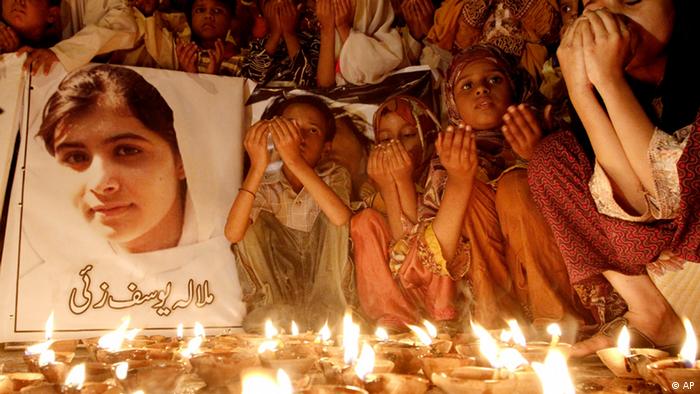The attack on a 14-year-old girl
in Pakistan has prompted society to take a firm stand against extremism, political scientist Andrea Fleschenberg tells DW.
DW: Ms. Fleschenberg, at the beginning of last week, the 14-year-old Malala Yousafzai was shot by the Taliban. The incident sparked uproar in the international media. How was it discussed in the Pakistani media?
Andrea Fleschenberg: This incident is tied to a number of issues and conflicts within Pakistani society and politics. In order to understand the frenzy it has caused among the public, one cannot see it as an isolated event. Of course, the Pakistani public is talking about an attack on a girl who has been fighting for an equality standing for girls' education in her region for years and through that campaigning became a public figure. But there are other issues - this incident is being mixed up with a public debate about US drone attacks.
The question of how Pakistan is dealing with the war on extremism in society is also being raised. And, in 2014, international troops are due to withdrawal from Afghanistan. What implications will that have? How will we get control over the threat posed by the Taliban after that? And then there's Malala - a template to discuss all that one more time. So it's not only about the assault on her, but it's also about the question: what kind of conflict are we talking about here? Is it a war lead by an international coalition? Or is it a conflict which should be dealt with more within society?
Is this societal conflict of which the Pakistani media are speaking also being brought up in politics? A number of Pakistani politicians have, after all, condemned the attack.
To some extent. Many politicians have criticized the fact that Malala was attacked, but only few have concretely condemned the Taliban for the attack. That has a lot to do with the power - or perceived power - the Taliban has. Many are afraid of jeopardizing their personal security by condemning the Taliban, who have also threatened the national and also international media after the attack.
People in Pakistan have been concerned with the political debate over drone attacks which you just mentioned and also the withdrawal of the ISAF from Afghanistan for some time now. Why has the Malala incident caused people to focus so strongly on these issues just now?
In Pakistan, we have seen a number of cases of violence against women - whether from society, politics or because of terrorism. These cases have always attracted a great amount of public attention. And it is quite easy for the media to then connect such topics with other important ones. On the other hand, the attack on a 14-year-old girl who is on her way to school with friends is also a real taboo - it is an attack on a child advocate of the rights guaranteed to her by the constitution - the right to an education. And then, in the Pakistani media, we have a number of people, be it scientists, politicians, journalists or bureaucrats, who are enraged over the incident.
How are ordinary people reacting?
It seems as though the section of the public which is furious about the attack because it was an attack on general values - and also the people who are afraid their daughters could very well be next - are less organized than, say, the people who so vehemently demonstrated against the Muhammad video weeks ago. There are much fewer people publicly demonstrating against the attack on Malala Yousafzai. Another thing we are seeing is that there is a part of society that criticizes women for becoming public figures through fighting for causes, or becoming victims of violence.
Considering the attention the media is giving the incident, do you think anything will fundamentally change with regards to the Taliban or women's rights? Or will all the commotion eventually die down?
That is the important question here and that is what is also being discussed - whether or not this is really a turning point. Was the attack on Malala such a shock for the nation that Pakistanis are now asking how they want to deal with the immense political challenge that the Taliban pose. A new president will be elected in 2013 and there are a number of different strategies: to either voice condemnation head on, to negotiate with them, or to order further military operations against them. What happened to Malala has really brought all that up. What is also important is the new debate about education that the incident triggered. Pakistani society has a problem - not only because the illiteracy rates among women and girls is very low in international comparison. It needs education to be able to handle economic and societal problems. But it is still very much up in the air whether or not anything will change.
Dr. Andrea Fleschenberg is a political scientist with the German Academic Exchange Service (DAAD) at the Quaid-i-Azam University in Islamabad, Pakistan.

No comments:
Post a Comment